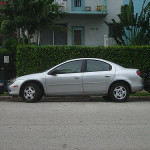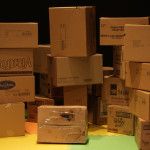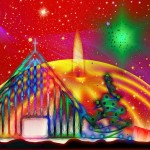Sermon by Randall T. Clayton, Brown Memorial Woodbrook Presbtyterian Church, Baltimore, MD, November 27, 2016, Advent 1
Text: Daniel 6
 Some years ago a week or two after purchasing a brand new Toyota we were spending a few days relaxing near the coast of Delaware. We went into Rehoboth Beach one evening for dinner, and parked on a residential street. While the houses on that street each had driveways, street parking in that area is at a premium in the middle of summer. We parallel parked our new car, the one without any blemishes or scratches, in a vacant place along the curb. We had dinner, perhaps walking along the boardwalk afterwards, and then headed back to our car. When we got to our car, however, we discovered that the vehicle which had been behind us when we had parked in that spot had been replaced by another car, but driver of that car left theirs parked almost on our bumper. There were not more than a handful of inches between the front bumper of their car and the back bumper of ours. Strangely, the same thing had taken place with the car in front of us. The one that was there when we parked was now gone, and in its place was a different car, whose driver had parked way too close to ours. It was immediately clear that we were boxed in. There was not enough room to maneuver our car out of the parking place and onto the street. We were boxed in. It seemed, at least for the moment, hopeless.
Some years ago a week or two after purchasing a brand new Toyota we were spending a few days relaxing near the coast of Delaware. We went into Rehoboth Beach one evening for dinner, and parked on a residential street. While the houses on that street each had driveways, street parking in that area is at a premium in the middle of summer. We parallel parked our new car, the one without any blemishes or scratches, in a vacant place along the curb. We had dinner, perhaps walking along the boardwalk afterwards, and then headed back to our car. When we got to our car, however, we discovered that the vehicle which had been behind us when we had parked in that spot had been replaced by another car, but driver of that car left theirs parked almost on our bumper. There were not more than a handful of inches between the front bumper of their car and the back bumper of ours. Strangely, the same thing had taken place with the car in front of us. The one that was there when we parked was now gone, and in its place was a different car, whose driver had parked way too close to ours. It was immediately clear that we were boxed in. There was not enough room to maneuver our car out of the parking place and onto the street. We were boxed in. It seemed, at least for the moment, hopeless.
I think many of us experience times like that – times when we are boxed in. Boxed in by our  bodies sometimes when they no longer do the things that we want them to do without crushing pain. Boxed in by a disease that will limit our lives. Boxed in when we face a choice between the lesser of two evils, rather than one choice that seems to be right. Boxed in because the job we want we didn’t get, or the college we hope to get into said “No,” or the investment we had staked so much on didn’t work out. Boxed in when we feel helpless to change a situation in our lives, our community, our nation, the world. Boxed in. Not able to go forward, not able to go backward, just like my car which was parallel parked on a neighborhood street one summer evening. Seemingly stuck in a situation we did not choose and did not wish to be in.
bodies sometimes when they no longer do the things that we want them to do without crushing pain. Boxed in by a disease that will limit our lives. Boxed in when we face a choice between the lesser of two evils, rather than one choice that seems to be right. Boxed in because the job we want we didn’t get, or the college we hope to get into said “No,” or the investment we had staked so much on didn’t work out. Boxed in when we feel helpless to change a situation in our lives, our community, our nation, the world. Boxed in. Not able to go forward, not able to go backward, just like my car which was parallel parked on a neighborhood street one summer evening. Seemingly stuck in a situation we did not choose and did not wish to be in.
The book of Daniel was written during a time when the Jewish people felt boxed in. Written centuries after the story it tells took place, the first readers of it were living in a time when they were experiencing discrimination, when the world looked bleak and the political leadership of their times was scary to them. Written in a difficult time when a people felt boxed in, the book of Daniel contains stories from an earlier day of a people who also were also boxed in a difficult situation they didn’t desire. The stories included in this little book were written to rekindle hope in seeming hopeless times and to help them plot a faithful path in light of their fears for the future.
As the story is told, Daniel was a foreigner and a Jew, living in exile under the Persian government after the nation of Judah fell. Having been carted far from home, and forced to live among people with different customs and a different heritage, Daniel along with the rest of the Jewish people in exile, longed to go back home; they longed to be restored to their homeland; they longed for a future that seemed brighter than their present.
The Persian king under which the Jews in exile lived was King Darius. Ruling a vast kingdom, under Darius there was a whole cadre of subordinate authorities which included three presidents and 120 satraps who essentially served as provincial governors. Now, although he was a foreigner, a Jew, and an exile, nonetheless, Daniel had risen in the ranks to become one of the presidents.
Because of Daniel’s “excellent spirit,” however King Darius planned to give him a rather large promotion, setting him above the other 2 presidents and all the satraps. But the knowledge of that impending promotion made the other presidents and satraps jealous. They tried to find evidence of corruption, or negligence in his duties, but they couldn’t find anything to pin on Daniel that might shoot down his rising star. So, they resorted to lying and conspiracy to get their way.
After having stoked the King’s ego, they told him a bold face lie. They said to King Darius that all three of the presidents and all of the prefects and all of the satraps and all of the counselors and all of the governors had agreed on one thing: that the king should establish and enforce a new rule, that anyone who prayed to anyone other than to Darius should be thrown into a den of lions. But all had not agreed to that—Daniel wasn’t even consulted. “Establish the law,” they said. “Put your signature on the document directing it, so that it can’t be changed or revoked,” they said. That was probably another lie…surely the Persian king could change his laws. Surely.
But be that as it may, the king established the law and at that point it appears to believe he was boxed in and not able to undo what he had done.
Now Daniel was also boxed in by the king’s actions….if he remained faithful to God, he would likely end up tangling with some hungry lions…but if he wasn’t faithful to God he would save his life.
Boxed in. What did Daniel do? He did not simply do nothing even though it appeared he was helpless and the situation seemed quite hopeless. He could have prayed in secret, I suppose. But what would that accomplish? He could have given up prayer as would have been required by the king’s decree. Instead, he opted to engage in civil disobedience. He opted to pray in the open, in the front of picture windows facing Jerusalem, in full view of everyone on the streets below. It was an act of civil disobedience.
 When the conspirators saw Daniel praying in the open, they rushed to the King, reminded him of the interdict he had signed, reminded him that he couldn’t change the law (even when perhaps he could have), and reminded Darius that Daniel now had a date with a lion’s den. Although the king was distressed when he heard about Daniel’s civil disobedience, he didn’t seem to have enough backbone to stand up to his courtiers and so Daniel was dropped into a den of hungry lions, presumably to meet a swift death. But God the defender of the defenseless, God the embracer of the exile and the immigrant, God the upholder of the vulnerable, shut the lions mouths, and Daniel emerged alive, in one piece, healthy.
When the conspirators saw Daniel praying in the open, they rushed to the King, reminded him of the interdict he had signed, reminded him that he couldn’t change the law (even when perhaps he could have), and reminded Darius that Daniel now had a date with a lion’s den. Although the king was distressed when he heard about Daniel’s civil disobedience, he didn’t seem to have enough backbone to stand up to his courtiers and so Daniel was dropped into a den of hungry lions, presumably to meet a swift death. But God the defender of the defenseless, God the embracer of the exile and the immigrant, God the upholder of the vulnerable, shut the lions mouths, and Daniel emerged alive, in one piece, healthy.
When Daniel was boxed in by the king’s decree, he did something to change things. He took some action. And I suspect he was able to take action because he had hope in God’s future. With hope, he prayed in public, he kept the faith. He held onto hope of God’s goodness and deliverance, and he did what he could do to resist the decrees of those in power when their decrees ran afoul of the love, and grace, and calling of God.
When my car was boxed in on a neighborhood street in Rehoboth, we wondered what to do. We realized we could start knocking on the doors of houses along that street in the hopes that we might find the owner of either the car in front of the one behind us. But in all likelihood the owners of those cars weren’t in those homes but in restaurants somewhere else in the town. We thought about calling the police, but other than issue a ticket, we figured there was little they could do. And so, it appeared that in our boxed in state, we could do nothing but sit and wait. But as we sat there, frustrated and angry, we seized upon another option….to use our driving skills and patiently work the car out of its jam. Over the course of the next hour or two we went forward a few inches, turned the wheel, and went back a few inches. Forward and reverse. Forward and reverse. Forward and reverse. Moving ever so slowly, moving ever so carefully, making what felt like almost imperceptible progress with each shift of the car’s direction. But finally, after much work we were able to get free of our box and start on our way home.
Some boxes in which we find ourselves allow only for small actions, like getting my car unboxed from its parking place. Sometimes it’s a multitude of small actions that mount up to ultimately transform the situation. To escape other boxes, or to help others escape them, we may be called us to become civilly disobedient as we engage in the struggle for freedom and liberation for all of God’s people. And other times, getting un-boxed may require that we re-think priorities, re-imagine a future, or commit ourselves to a different path. But in each case, it seems to me, the energy to transform those boxed in situations grows out of hope. Without hope, we would only be helpless in difficult or scary times.
As we enter the season of Advent, we recall where our hope is found: It is found in God’s redemption, God’s salvation, and God’s future. The hope we remember as we prepare for Christmas is a hope that is grounded in what God did in and through a man named Jesus, who looked like us, lived like us, and yet was God. Our hope is in one who was born to a poor, unwed, peasant teenager, who turned the world upside down with his love and who invites us to do the same.
Despite the sometimes bleak outward circumstances in which we find ourselves, despite fear of the future that we sometimes feel which Daniel surely felt too when he was told he couldn’t pray, despite a sense of helplessness to do anything sometimes to change the course of our own history or the history of our world, there is a God in whose future we stand. And knowing that we stand in God’s future, and knowing God’s love shown to us in Jesus Christ, perhaps our hope may motivate us to continue to do whatever it is that we can to stand for love, to stand for justice, to stand for peace, even in this world, even if it means only taking tiny steps.
If we are going to get out of the box, it takes hope. And hope is always in generous supply in God’s household.
